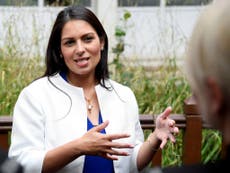Boris Johnson is heading to Berlin today looking for a deal – but from what I've heard, the EU isn't ready to compromise
Serious negotiations between the prime minister and the EU27 won't begin until September – we're deep into a game of brinkmanship

Four weeks after becoming prime minister, Boris Johnson finally engages with the big players on the EU stage. As he heads to Berlin today, and Paris tomorrow, the biggest question is: does he really want a Brexit deal?
The answer is yes – but only on his own terms. And that is a very big “but”.
He will need to compromise to get an EU agreement, and Boris is not in the mood to do so, as his letter to the European Council president Donald Tusk showed.
Why did Johnson set the bar so high? His demand for the Irish backstop to be scrapped rather than changed is a double insurance policy – against inevitable claims of a sell-out by Nigel Farage’s Brexit Party at a general election, and also against the EU, so he can blame the 27 if he decides to leave with no deal. “The letter is all about the blame game,” one EU source told me. The EU, of course, has its own insurance policy: it’s called the backstop.
On the home front, the PM had to show willing and at least go through the motions of engaging with EU leaders. If he is to win a Brexit election, he has to present no-deal as the only way to deliver Brexit, not a deliberate act of policy.
By waiting a month, he has made his point to the EU, in a calculated break with traditional niceties. Civil servants involved in the handover from the Theresa May regime expected Johnson to make an early visit to Dublin, but he decided to make the EU sweat and take every opportunity to tell the 27 he is deadly serious about leaving on 31 October “with or without a deal”.
He garnered lots of headlines about “turbo-charging” no-deal preparations. Withdrawing UK ministers and officials from most EU meetings underlines the message. But it will hardly improve the atmosphere in Johnson’s discussions with Angela Merkel tonight and Emmanuel Macron tomorrow, and in the margins of the G7 summit in Biarritz at the weekend.
We shouldn't expect much progress over the next few days. “We are expecting ‘nein, nein, nein,’” one ally of the PM quipped ahead of tonight’s dinner in Berlin. The EU is not ready to compromise yet either: in Brussels, they follow every twist and turn of the UK debate with microscopic focus. They know what’s in our newspapers as soon as British ministers do. After a month of speculation about how MPs might stop no-deal, it’s natural for the EU to wait and see if that happens in the two weeks after MPs return on 3 September.
If it doesn’t, we might finally see some serious negotiations, rather than the restatement of both sides’ positions we will get this week.
Johnson tried to turn the Commons revolt to his advantage in a series of TV interviews last night. “As long as they [the EU] think that there is a possibility that parliament will block Brexit, they are unlikely to be minded to make the concessions that we need,” he told Sky News. Yet another insurance policy, setting up a “people versus parliament” election.
MPs opposed to no-deal have a big dilemma. There will be no time to waste when the Commons returns. But I detect little chance of enough Conservative MPs voting to bring down their own government in a September no-confidence vote. About 15 Tories might be needed to cancel out abstentions or votes for Boris by Labour and independent MPs. There would be a much better chance of achieving that number in October as the cliff edge loomed.
The trouble is that, unless no-deal opponents agreed on an alternative PM within 14 days, the election could not then take place until November and Johnson could take the UK out on 31 October. So MPs’ energies would be much better put into passing a law forcing Boris to seek an extension to UK membership, so the public could have a real choice at an election.
Johnson believes the EU will blink at the last minute, because that is how it does business. But this is a huge gamble; there’s always an exception to the rule. Whatever the EU’s fears about no-deal, there is no sign of Germany and France abandoning Ireland. They will put the solidarity that underpins the EU project first. If Leo Varadkar, the Irish prime minister, were prepared to show flexibility on the backstop, they would move. But that might be a step too far for him domestically.
The EU’s refusal to budge persuades some Johnson allies that the only way he can deliver Brexit is via no deal. His advisers would be split if, in October, the EU offered a time limit to the backstop.
There's no guarantee that last-minute talks would succeed by 31 October, anyway. So MPs in all parties who oppose no-deal should not be warned off by Johnson's claim that they are preventing a deal.
They must set aside their differences and personal rivalries in order to stop no-deal. Otherwise, they will deserve to share the blame for it.




Join our commenting forum
Join thought-provoking conversations, follow other Independent readers and see their replies